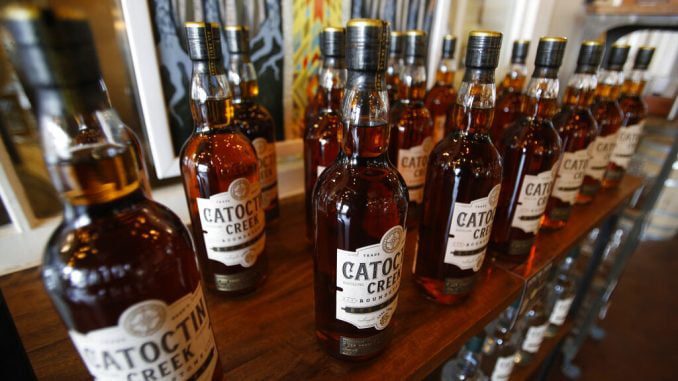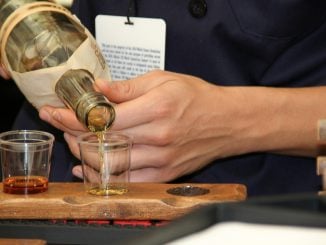
RALEIGH — The coronavirus pandemic has inflicted major economic losses on the nation’s retail and hospitality sectors. However the spirits industry which also includes sales of beer and wine, has gone gangbusters as people find themselves quarantining at home and turning to the proverbial “cocktail hour” as a means to relieve pandemic-related stress.
Even certain politicians in charge in various states have done their part to ensure Americans have ready access to spirits. For instance, in March New York Gov. Andrew Cuomo said the state’s Liquor Authority would change its rules to allow bars, restaurants and distilleries to sell their products off-premises. Similarly, in May Florida Gov. Ron DeSantis allowed bars and restaurants to deliver alcohol, and other states followed suit by lifting certain restrictions on distillers as well.
According to Nielsen’s market data, total alcohol sales outside of bars and restaurants have risen roughly 24% during the pandemic as compared with last year. Sales of spirits with higher alcohol content rose even faster, topping a 27% increase over last year. NPR reports the pandemic has created a spike in online sales using phone apps that connect consumers with local liquor stores for home delivery.
Here in North Carolina, which is home to roughly 80 distilleries, owners and operators say they are grateful their business has fared as well as it has over the course of the last nine months, and are glad to see the news focusing on something other than criticism surrounding the state-controlled ABC Commission. North Carolina is one of only 17 alcohol control states left in the country, and it is what is known as a local option state, where each county or city’s voters decide whether alcohol can be sold. The state’s ABC Commission has been at the center of various media firestorms, including a 2018 audit that found the agency wasted nearly $14 million in taxpayer funds. Most recently, the agency has taken heat from a small group of NC distillers who say the agency tries to manufacture and enforce illegal rules, without the authority to do so.
Jonathan Blitz, who runs Durham’s Mystic Farm & Distillery spoke to the media last fall about a series of incidences in which Alcohol Law Enforcement agents visited his distillery and seized bottles of opened liquor from his kitchen during a routine compliance check. While Blitz argued he was using the open bottles as reference samples, the agent said it wasn’t allowed and the ABC Commission sued him for possession of unauthorized spirits.
“My fear is that we might be creating a void where we were previously seeing progress, building bridges, and opening the lines of communication.” — Leah Howard, manager of Asheville’s Cultivated Cocktails Distillery
According to state law, distillers must have a mixed beverage permit in order to sell other people’s liquor, however Blitz argued the bottles being seized were reference samples, commonly used as a means of comparison. Another part of state law deals with a complex permitting process which requires distilleries to store their spirits only in designated and preapproved areas of their facilities. This may in fact have been the reason Blitz was found in violation.
To be a distillery, you must have a state permit and a federal permit that allows for the making of spirits in a bonded area. That area is for production, research and development and packaging. No cocktails, spirits on which taxes have been paid, or retail bottles can be in that space. However, with the passage last year of SB 290, distilleries in N.C. can now obtain permits for mixed beverages, wine and beer. The on-premise permit allows for the sale of beer and wine both in a retail permitted area, and to go in closed containers that have been approved by the feds. It’s the same policy that applies for any private club, bar, restaurant, brewery or winery that decides to sell cocktails or other alcohol. Furthermore, industry insiders say at no time has it ever been legal to have alcohol in a retail permitted area that isn’t purchased under a distiller permit number issued by the state.
While the state’s distillers are a tight knit and supportive community, not all agree when it comes to issuing harsh criticisms of how the ABC Commission operates. Several owners say they have seen real progress over the last couple years and worked very constructively with the three-person agency.
“My fear is that we might be creating a void where we were previously seeing progress, building bridges, and opening the lines of communication,” says Leah Howard who manages Asheville’s Cultivated Cocktails Distillery. Cultivated makes Hazel 63 Rum, Hwy 9 gin, Shades of Rosé gin, Asheville coffee liqueur, Asheville Vodka, & Asheville Creme de Cacao. Howard says she feels the ABC Commission has really made an effort to work with the state’s distillers over the last couple years pointing to SB 290, the ABC Regulatory Reform Act. The Distillers Association of North Carolina (DANC) worked alongside the legislature to help push the bill through last year. The bill eased restrictions on distilleries by lifting the cap for on-site sales and allowing distillers to sell cocktails out of their facilities, thereby creating a more even playing field with breweries and wineries.
Up until last year, distilleries were restricted to only serving communion cup-sized samples of liquor to guests with no mixers. The bill also lifted the five-bottle-per-year restriction for on-site sales.
Paul Gussenhofen, a distiller with Covington Sweet Potato Vodka in Snow Hill says he doesn’t see the agency overreaching, and actually thinks they want the businesses in his industry to succeed. “I haven’t had any issues with the ABC Commission. They’ve come in here a few times to inspect, but unless I am doing something blatantly wrong, they just leave. It’s in their best interest to help all of us succeed so I don’t think they are trying to implement any unfair rules.”



